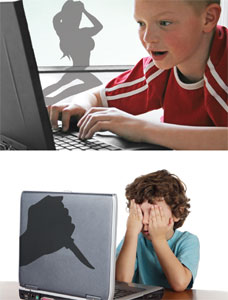|
What's Happening Online
Computers have brought untold benefits to children around the
world, with the number of connected households increasing each year. By
the end of 2008, there were over 1.5 billion people online, up from
under 200 million at the beginning of 1998.
But while the potential for good is undisputed, it has also raised
new and disturbing issues, especially where children are concerned.
According to surveys:
-
Around 90% of teens and young adults use the Internet.
-
Over 60% of children and teenagers talk in chat rooms on a daily
basis.
-
3 in 4 children online are willing to share personal information
about themselves and their family in exchange for goods and
services.
-
1 in 5 children will be targeted by a predator or paedophile
each year.
-
While 30% of teenage girls say they have been sexually harassed
in a chat room, only 7% tell their parents, for fear their online
access will be limited.
What Many Parents Don't Know
 There
is a disconcerting gap between what parents think and children know. So
while 92% of parents say they have established rules for their
children’s online activity, 34% of children say their parents haven’t.
These patterns are consistent in other countries across the world: There
is a disconcerting gap between what parents think and children know. So
while 92% of parents say they have established rules for their
children’s online activity, 34% of children say their parents haven’t.
These patterns are consistent in other countries across the world:
-
In France, 72% of children surf online alone, and while 85% of
parents know about parental control software, only 30% have
installed it.
-
In Korea, 90% of homes connect to cheap, high-speed broadband,
and up to 30% of Koreans under the age of 18 are at risk of Internet
addiction, spending two hours a day or more online.
-
In the UK, 57% of 9-19 year olds say they’ve seen online
pornography, 46% say they’ve given out information they shouldn’t and 33% say they’ve been bullied online.
-
In China, 44% of children said they had been approached online
by strangers, and 41% had talked to an online stranger
about sex, or something that made them feel uncomfortable.
What Are The Online Risks?
 Pornography Pornography
While filtering programs and parental controls are getting better, many
children around the world are still at risk of viewing images that they
aren’t mature enough to understand. Even worse is when
children themselves are used and depicted as sexual objects.
Violence
While aggression is an unfortunate part of life, the sheer range and
volume of online violence is something most of us don’t want our
children exposed to: images of war, domestic abuse, bigotry,
misogyny
and other vicious attacks.
Online
Gaming & Addiction
There is a growing body of evidence that many children are developing an
unhealthy addiction to spending time online. Often, this addiction takes
the form of internet gaming, but essentially any online activity can
become addictive. The dangers of such an addiction are an increased risk
of health
 and social problems. and social problems.
Online Fraud
Many fraudsters like to specifically target children, as young people
often don’t have the experience and knowledge to distinguish legitimate
requests from fraudulent ones. Fraudsters can use knowledge gained from
children online to steal, blackmail, terrorize
or even kidnap.
Cyber-bullying
 With the
arrival of the Internet and mobile technology, children today
are open to bullying and intimidation wherever
they are – it’s no longer just a playground event. Surfing the internet can have severe
consequences With the
arrival of the Internet and mobile technology, children today
are open to bullying and intimidation wherever
they are – it’s no longer just a playground event. Surfing the internet can have severe
consequences
for a child’s self-confidence and personal development.
Racism
The Internet has given us instantaneous global access. While this can
promote greater communication, understanding and respect,
it also makes it easier to spread racial abuse and hate.
|
|



